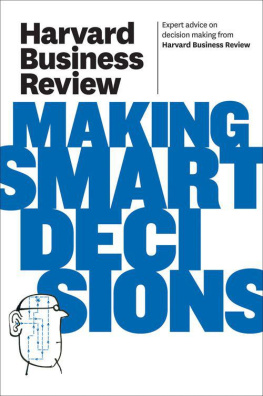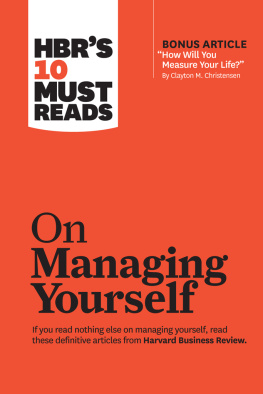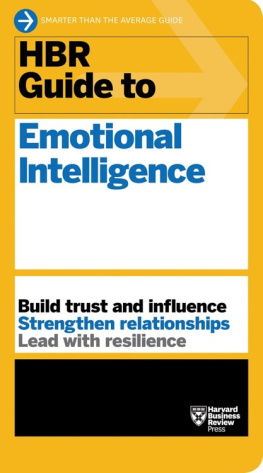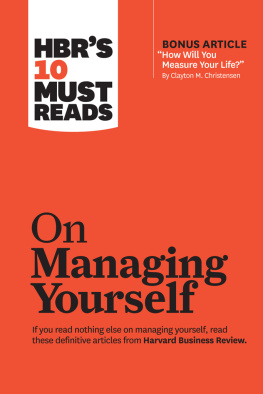HBR Press Quantity Sales Discounts
Harvard Business Review Press titles are available at significant quantity discounts when purchased in bulk for client gifts, sales promotions, and premiums. Special editions, including books with corporate logos, customized covers, and letters from the company or CEO printed in the front matter, as well as excerpts of existing books, can also be created in large quantities for special needs.
For details and discount information for both print and
ebook formats, contact ,
tel. 800-988-0886, or www.hbr.org/bulksales.
Copyright 2020 Harvard Business School Publishing Corporation
All rights reserved
No part of this publication may be reproduced, stored in or introduced into a retrieval system, or transmitted, in any form, or by any means (electronic, mechanical, photocopying, recording, or otherwise), without the prior permission of the publisher. Requests for permission should be directed to , or mailed to Permissions, Harvard Business School Publishing, 60 Harvard Way, Boston, Massachusetts 02163.
The web addresses referenced in this book were live and correct at the time of the books publication but may be subject to change.
Cataloging-in-Publication data is forthcoming.
ISBN: 978-1-64782-049-7
eISBN: 978-1-64782-050-3
Contents
- Thinking holistically about the pandemic and recovery.
- by Martin Reeves
- Start by coaching your team to decide with speed over precision.
- by Chris Nichols, Shoma Chatterjee Hayden, and Chris Trendler
- Eight factors leaders should know.
- by Peter Susser and Tahl Tyson
- Lessons from Lincoln, Churchill, MLK, and others.
- by Nancy Koehn
- How leaders, managers, and employees can make the sudden shift.
- by Tsedal Neeley
- Especially if you have to deliver the news remotely.
- by Rebecca Knight
- Be compassionatebut act quickly.
- by Alisa Cohn
- Six lessons from grocery stores and other essential businesses.
- by Sarah Kalloch and Zeynep Ton
- Control your physical and mental arousal like an athlete.
- by Michael Gervais
- How to leave work at work when you dont leave the house.
- by Laura M. Giurge and Vanessa K. Bohns
- The classic five stages of grief can help us find meaning in this moment.
- by Scott Berinato
- Five strategies for communicating with customers during a crisis.
- by Ted Waldron and James Wetherbe
- What paths could recovery take?
- by Philipp Carlsson-Szlezak, Martin Reeves, and Paul Swartz
- Move beyond short-term needs to long-term reform.
- by Megan Tobias Neely
- Its crucial for creating new opportunities and finding new ways to grow.
- by Martin Reeves and Jack Fuller
Introduction
BROADENING YOUR PERSPECTIVE ON CRISIS LEADERSHIP
by Martin Reeves
In the midst of the Covid-19 pandemic, the topic of crisis management is at the forefront in business conversations worldwide. This concentration on surviving the immediate crisis is understandable and useful in the short termit enables us to focus on the immediate, high-stakes issues we are all facing. But with constant urgency and stress comes a narrowing of perspectives and time horizons. This inhibits deeper and broader reflection, which is necessary in responding effectively to the crisis, rebounding from it, and reinventing our businesses after it passes. A return to long-term and broader thinking wont happen by default. One of the key roles for leaders, now that the initial shock is behind us, is to legitimize and foster a rebroadening of perspectives.
In my role as Chairman of the BCG Henderson Institute, Ive interacted with hundreds of companies in client roundtables over the past few weeks, and it has struck me that many companies are still stuck in reacting to the immediate crisis. Reaction is only the first stage of a multistage game. The urge to minimize damage will never, for example, result in designing creative strategies to address new needs and shape the emergence of new market segments. To balance crisis management with thinking holistically about the crisis and its aftermath, leaders need to reframe their thinking and action appropriately as each phase unfolds.
A few years ago, I coauthored a book titled Your Strategy Needs a Strategy, which proposed that different situations call not only for different strategies but for different approaches to strategy and problem solving. Specifically, we proposed a strategy palette, comprising five distinct styles of problem solving: classical (plan driven), adaptive (iterative experimentation and adjustment), shaping (coevolution and collaboration), visionary (creative), and renewal (turnaround). Each style requires adopting the right model, tools, metrics, behaviors, and leadership styles to effectively respond to the situation at hand.
In the language of the strategy palette, companies facing Covid-19 need to create temporal ambidexterity: the ability to switch and apply different problem-solving styles over time. First, we need to react urgently and pragmatically to the crisis, using a renewal approach. But after this reactionary phase we need to implement planned measures to manage cash burn in the now inevitable economic downturn, using a classical style. As the disease and the economic aftermath develop unpredictably, we need to learn rapidly about the latest developments and flex our tactics accordingly, using an adaptive style. Every crisis contains opportunity, and once the acute phase of the disease is controlled and the economic aftermath managed, we will need to think about capturing opportunities in the new post-Covid reality, using visionary














